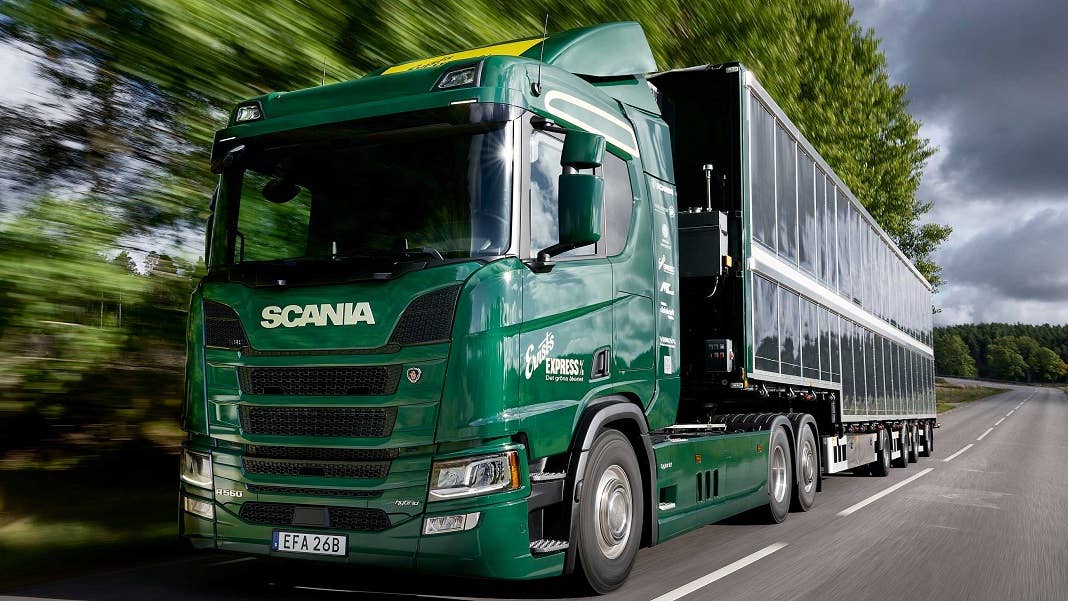This Hybrid Solar Truck Can Go Over 6,000 Miles a Year on Pure Sunshine

Share
Switching from combustion-engine cars to electric vehicles is going to be an important part of the renewable energy transition. But for the switch to truly make a difference, the electricity powering the next generation of cars will also have to be all-green, and the grid is quite a ways from that reality. One small loophole is solar cars—the loophole is small because the technology isn’t advanced enough to put any sort of significant dent in the vehicles’ electricity need, but it’s a start.
There are a handful of solar cars in production, from the $6,800 golf-cart-like Squad car to the sleek $250,000 Lightyear 0 (and let’s not forget the OG Aptera and more recent arrival Sion). Now a Swedish manufacturer is taking the solar concept and going bigger with it—big-rig big, that is. Scania’s hybrid solar truck was tested on public roads for the first time last week.
One of the first vehicles of its kind, the truck is a research project involving both academia and industry, and its creators hope it will be a step toward reducing the trucking industry’s environmental footprint. It could also cut fuel costs for drivers and ultimately reduce the total cost of moving goods from one place to another.
Hybrid solar vehicles have a battery that can be plugged in to charge, but they’re also decked out with solar arrays that provide an alternate energy source. Scania's truck has solar panels covering an area of 100 square meters (1,076 square feet), all on the sides and top of the 59-foot-long trailer. The panels were specially made for this project, and the team says they’re more lightweight and efficient than the current industry standard.
The truck has a 560 horsepower engine, and its solar array can provide up to 8,000 kilowatt hours (kWh) of energy per year in Sweden or similar climates—that equates to around 5,000 kilometers (3,107 miles) of driving range. Being as far north as it is, Sweden’s not the sunniest place; the researchers say that in sunnier climates (the example they give is Spain) the range could double, reaching about 6,200 miles a year.
Be Part of the Future
Sign up to receive top stories about groundbreaking technologies and visionary thinkers from SingularityHub.


The team is also working on developing tandem solar cells with an even higher efficiency, which they say could double the solar energy generation a second time over. The truck’s batteries have a total capacity of 300 kWh, 100 kWh placed on the truck and the remaining 200 kWh on the trailer.
Besides gauging how much solar energy the truck’s panels can produce under various conditions, the researchers are monitoring how much an average truck’s carbon emissions would decrease if outfitted with a comparable solar setup. They’re also looking at various ways solar trucks could interact with the power grid (bi-directional charging, where the truck’s panels could give energy back to the grid or help power a facility, could be one possibility), and what the impact on the grid might be in a future where there are many hybrid solar trucks.
It will likely be a while before we see solar-panel-clad big rigs rolling down highways; for one, solar technology will need to improve dramatically before it becomes practical for widespread use on cars and trucks. But projects like Scania’s are a start, pointing us towards a future of cleaner, greener transportation.
Image Credit: Scania
Vanessa has been writing about science and technology for eight years and was senior editor at SingularityHub. She's interested in biotechnology and genetic engineering, the nitty-gritty of the renewable energy transition, the roles technology and science play in geopolitics and international development, and countless other topics.
Related Articles

US Solar Surged 35% in 2025, Overtaking Hydro for the First Time

Meta Will Buy Startup’s Nuclear Fuel in Unusual Deal to Power AI Data Centers

Your ChatGPT Habit Could Depend on Nuclear Power
What we’re reading